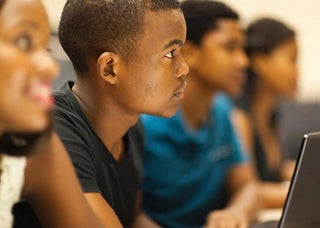

“All right, hear me out,” begins the young black woman in a video uploaded to the website LiveLeak last Friday. “There is no such thing as ‘talking white,’ … it’s actually called ‘speaking fluently,’ speaking your language correctly. I don’t know why we’ve gotten to a place where as a culture—as a race—if you sound as though you have more than a fifth-grade education, it’s a bad thing.” She continues like this for nearly two more minutes, emphasizing the point that her speech reflects proper English and attacking the idea that it’s a deviation from black identity. If she was hoping for a positive response, she got it. In addition to thousands of shares and tweets, it reached more than 560,000 views and made the front page of Reddit.
Not that this was a surprise. The main ideas—that black Americans disparage “proper English” and education and use a “broken” version of the language—have wide currency among many Americans, including blacks. “Ebonics” is mocked as a fake language, and efforts to use it in schools have sparked vocal opposition. When the Oakland, California, school board approved Ebonics for use in its schools in 1996, a flurry of public figures condemned the decision. “I understand the attempt to reach out to these children, but this is an unacceptable surrender, bordering on disgrace,” said the Rev. Jesse Jackson, who later reversed his stance, but not before he was endorsed by a wide range of people.
AdvertisementAt the time, linguists protested the criticism, noting the extent to which Ebonics—officially known as African American Vernacular English—is recognized as a language system with its own grammar and pronunciations, with roots in the regional dialects of 17 th -century Great Britain. Far from being slang or broken, AAVE is a distinct form of English used by many blacks in informal settings.